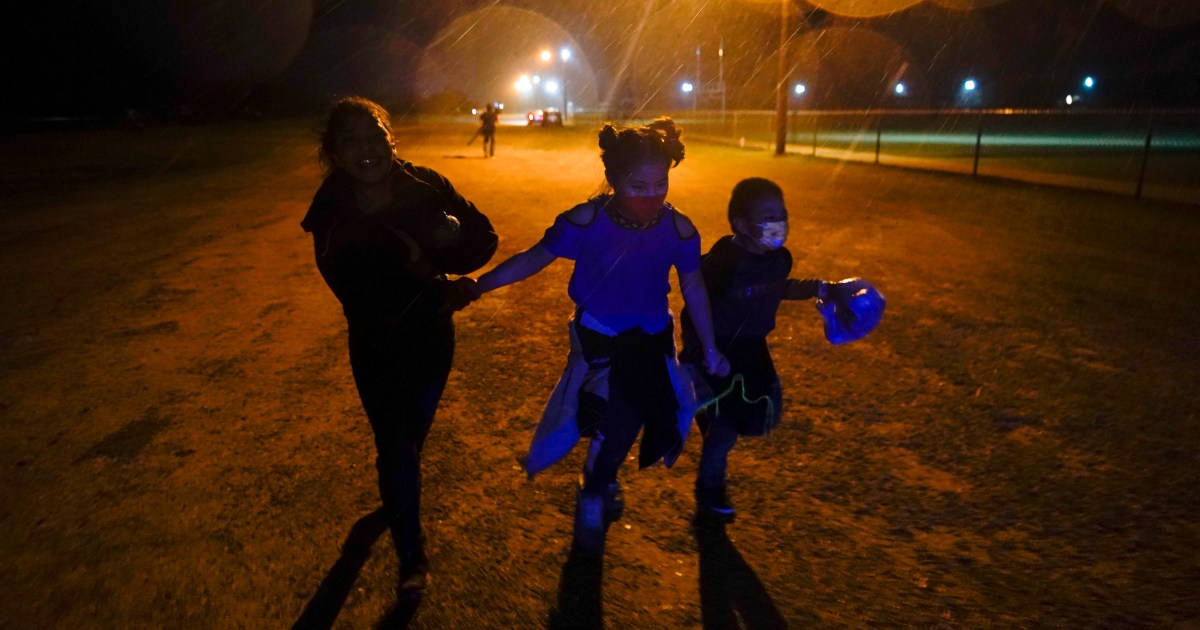The announcement of the end of Title 42 has revolutionized the Mexican immigration board.
On May 11, the United States ends the covid-19 health emergency and with it the controversial measure that allowed the immediate expulsion of migrants who crossed the border without permission.
For three years, Mexico had become the waiting room for all those who were rejected by its neighbor to the north.
Now, with the extinction of Title 42, the doors of the United States will not open, but the Foreign Secretary, Marcelo Ebrard, has acknowledged that a sharp increase in the transit of migrants is expected, who desperately seek to get closer to the US side.
The impact of the announcement is going through the country like a current from south to north.
In Tapachula, on the border with Guatemala, there have been new fights in recent days between migrants who are fighting to speed up the immigration procedures that allow them to leave Chiapas and continue their journey.
In Mexico City, one of the recurring stops, some shelters are emptying because migrants have rushed to the border.
"The desperation to arrive has meant that those who had a procedure or those who were waiting for their asylum application have abandoned it because they wanted to arrive as soon as possible," explains Gabriela Hernández, director of the Tochán shelter.
In Ciudad Juárez, the US authorities estimate that there are already some 12,000 people waiting to cross next Thursday to El Paso, where its mayor, Óscar Leeser,
has declared a state of emergency.
Leese points out that another 3,000 from a new caravan can join.
“We are seeing a very important flow in recent days based on a deception, which is: they tell the Venezuelan, Central American people, 'hurry up to get to the United States by crossing Mexico because on May 11 they are going to remove Title 42 ”, Ebrard said this Friday at a press conference.
The foreign minister has insisted that the message of free entry is false, because the country has other legal provisions.
A Border Patrol agent searches a Honduran man who was caught crossing the border, on April 26 in New Mexico.PAUL RATJE (REUTERS)
Title 42 is an old directive revived by Donald Trump to contain illegal migration under the pretext of the health crisis during the pandemic.
His disappearance was a matter of time.
In the last three years it has operated in conjunction with Title 8. For example, in December of last year, Customs and Border Control (CBP) made 251,487 arrests, of those, 50,000 were people sent to Mexico under Title 42, but the other 202,000 were deported to their countries of origin under Title 8. This measure has been applied since 1995 and implies an administrative sanction: for five years the foreigner cannot re-enter the United States, not even for tourism or for family reunification purposes.
That is what the United States will continue to use.
“There is misinformation among the migrant population that believes that the completion of Title 42 will open the doors for them to enter the United States and start the asylum application process, but it is the opposite.
After May 11, any person who tries to enter illegally will be deported under Title 8”, explains Inés Barrios, academic coordinator of the Colegio de la Frontera Norte.
As an example of the US strategy, the researcher gives the example of the 1,500 soldiers that the Joe Biden government has sent to the border, which join the 3,500 that were already patrolling the border, to contain the arrival of thousands of migrants.
"Given this change in situation, what we see is a militarization by the United States," explains this Migration doctor, "and on the part of Mexico we do not see any clear action to respond to the reception of these migrants."
Military vehicles parked along the border wall in Brownsville, Texas, on May 3, 2023.MICHAEL GONZALEZ (Getty Images via AFP)
This is a delicate moment for a paradigm shift in immigration policy.
The Mexican National Institute of Migration (Inami) faces a complex situation after the fire in one of its centers in Ciudad Juárez that left 41 migrants dead and for which the head of the Inami, Francisco Garduño, is accused, among a dozen federal officials. .
With an institution between the ropes, Mexico is going to have to adjust to the migratory pressure that lives between its borders and to the pushes of the Joe Biden Administration, where migration has become a critical issue for Democrats.
The Government of Andrés Manuel López Obrador has agreed to continue receiving Venezuelans, Cubans, Haitians and Nicaraguans, who instead of being deported to their countries, will be sent back to Mexico.
With a change: before Title 42 allowed migrants to try to cross many times because there were no consequences when being expelled to Mexico, but now if the United States expels migrants of these nationalities under Title 8 to Mexico, the administrative sanction prevents them from returning to try to cross legally in five years.
This leaves two options: "That the processes of irregular and clandestine routes increase, that migrants are forced to hire a trafficker, which increases vulnerability," says Inés Barrios, or the long-term wait in a converted country. in a pressure cooker
The sun does not let up in Ciudad Juárez.
Someone has circulated the rumor that gate 36 of the wall that separates Mexico from El Paso, in the US, is open.
Hundreds of migrants embark on a nearly two-hour walk that separates this gate from the city center.
In the groups there are pregnant women, children and baby carriages.
Most do not have water or anything to protect themselves from the sun, but the hope of crossing is stronger.
It is the end of March and there is no gap on the other side, so the migrants have to turn around and continue waiting, sleeping in shelters, asking for money, cleaning car windows.
This is how thousands of people survive in Mexico, reeling from misinformation and uncertainty, while trying to get an appointment on the CBP One app,
that the US authorities have made available to request asylum in the country.
In this vulnerable context, in which even a WhatsApp causes a caravan, the end of Title 42 turns everything upside down.
subscribe here
to the
EL PAÍS México
newsletter and receive all the key information on current affairs in this country
Subscribe to continue reading
Read without limits
Keep reading
I'm already a subscriber



/cloudfront-eu-central-1.images.arcpublishing.com/prisa/5RJCSJ7SZRBQFPEKCHV5BZZCRE.jpg)





